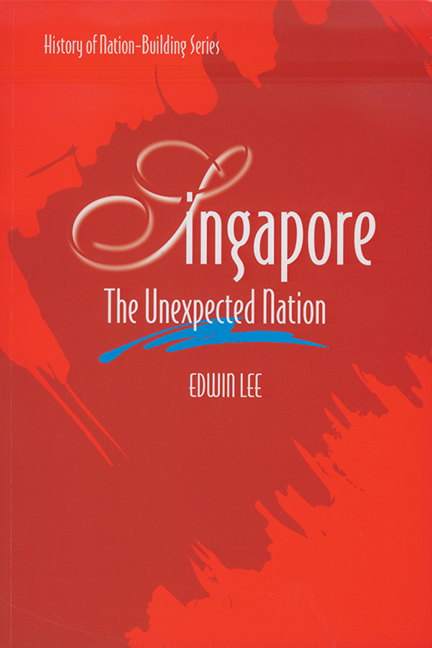Book contents
- Frontmatter
- Dedication
- Contents
- Preface
- Introduction by Wang Gungwu
- Chapter One Beginnings: From Temasek to Singapore
- Chapter Two Race, History and Nationalism
- Chapter Three Contestants and Contesting Visions
- Chapter Four The Accidental Chief Minister
- Chapter Five The Terminal Chief Minister
- Chapter Six The Embattled Prime Minister
- Chapter Seven Merger: Contesting Ownership and Principles
- Chapter Eight Terms of Disendearment
- Chapter Nine Dare to be Equal
- Chapter Ten The Way to Survive
- Chapter Eleven National Service: The Price of Independence
- Chapter Twelve Politics of Education
- Chapter Thirteen Home Ownership, National Stability and the New Middle Classes
- Chapter Fourteen University and Nation
- Chapter Fifteen Toh's Nation-Building Thrust
- Chapter Sixteen Nantah: Between Community and Nation
- Chapter Seventeen Self-Renewal: Talents for a Tough Act
- Chapter Eighteen The Consensual Prime Minister
- Chapter Nineteen Confucianism, Christianity, Chineseness
- Chapter Twenty Singapore Dreams, Singapore Dilemmas
- Chapter Twenty-One The Hyphenated Singaporean
- Chapter Twenty-Two The Unexpected Nation
- Bibliographical Note
- Index
- The Author
Chapter Eight - Terms of Disendearment
Published online by Cambridge University Press: 21 October 2015
- Frontmatter
- Dedication
- Contents
- Preface
- Introduction by Wang Gungwu
- Chapter One Beginnings: From Temasek to Singapore
- Chapter Two Race, History and Nationalism
- Chapter Three Contestants and Contesting Visions
- Chapter Four The Accidental Chief Minister
- Chapter Five The Terminal Chief Minister
- Chapter Six The Embattled Prime Minister
- Chapter Seven Merger: Contesting Ownership and Principles
- Chapter Eight Terms of Disendearment
- Chapter Nine Dare to be Equal
- Chapter Ten The Way to Survive
- Chapter Eleven National Service: The Price of Independence
- Chapter Twelve Politics of Education
- Chapter Thirteen Home Ownership, National Stability and the New Middle Classes
- Chapter Fourteen University and Nation
- Chapter Fifteen Toh's Nation-Building Thrust
- Chapter Sixteen Nantah: Between Community and Nation
- Chapter Seventeen Self-Renewal: Talents for a Tough Act
- Chapter Eighteen The Consensual Prime Minister
- Chapter Nineteen Confucianism, Christianity, Chineseness
- Chapter Twenty Singapore Dreams, Singapore Dilemmas
- Chapter Twenty-One The Hyphenated Singaporean
- Chapter Twenty-Two The Unexpected Nation
- Bibliographical Note
- Index
- The Author
Summary
The London talks of July 1962, based on the Cobbold Report, set the target date for the incorporation of the Borneo territories into Malaysia at 31 August 1963, allowing an intervening period of a year and a month during which constitutional safeguards and other details would be settled. This period would also be used for more bilateral discussions between Malaya and Singapore, and Malaya and Brunei, on important issues on which their positions were still far apart. However, the definitive significance of this period, marking the run-up to Malaysia, lies not only in these discussions. The Malaya-Singapore discussions were accompanied by a growing rift and rivalry between their two prime ministers, the Tunku and Lee. The two men of different personality, world view and political power base, felt, in the approach of merger, a heightening of the otherness of his opposite number and a desire for mastery over him. The issues at stake in this contest of will and power, which were inseparable from the outstanding issues of the merger itself, threatened to scuttle the merger completely. The strife between the two prime ministers was not the only danger on the merger horizon. Key national leaders in the surrounding region, which comprised island Southeast Asia, began to advance a territorial claim (the Philippine claim to North Borneo), and to oppose Malaysia as a neo-colonial design meant to perpetuate Western influence in their neighbourhood. This external dimension of conflict was to have major impact on the internal merger programme.
The Tunku and the “Troublemaker”
The Tunku and Lee were agreed on the danger posed by the communists and communist proxies in Malaya and Singapore, but differed in their attitude towards communist countries of the world. The Tunku extended his uncompromising stand against communists within his territory to communists globally, resembling the American attitude in that cold war era. Lee's approach was more neutral and pragmatic: he would trade with communist nations on the understanding that trade should be kept separate from politics and ideology. For the present, his purpose was to visit them and explain that he was no British stooge, but a nationalist who believed Malaysia was for the best. When he discussed with the Tunku his plan to visit Belgrade, Moscow, and Beijing as well as New Delhi and Cairo, the Tunku was aghast.
- Type
- Chapter
- Information
- SingaporeThe Unexpected Nation, pp. 217 - 238Publisher: ISEAS–Yusof Ishak InstitutePrint publication year: 2008

